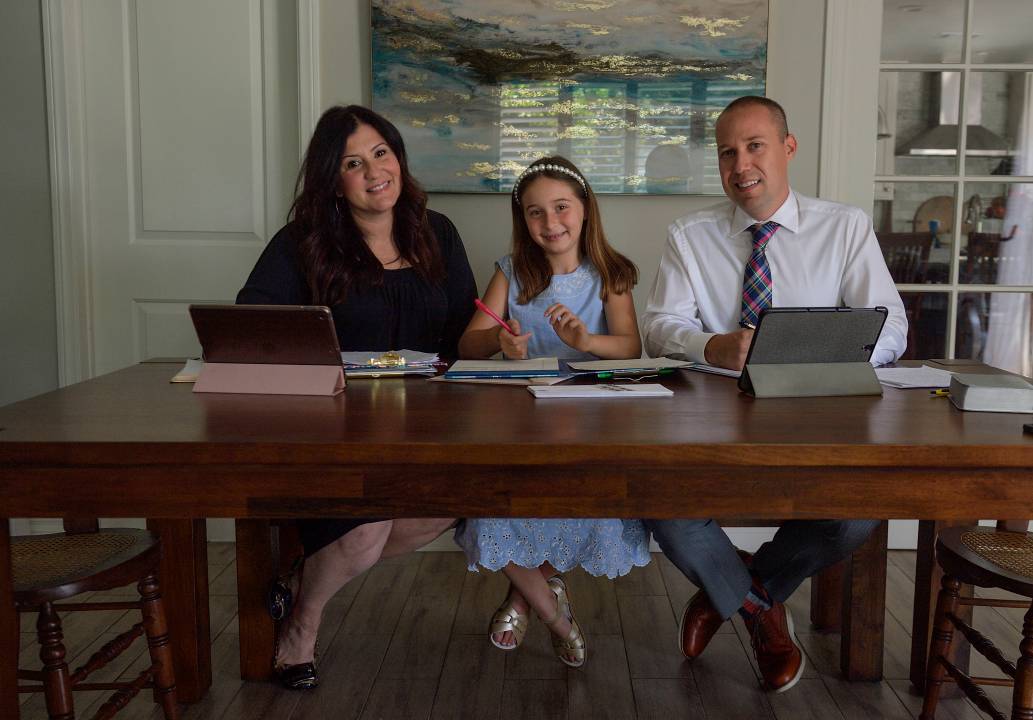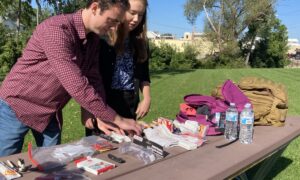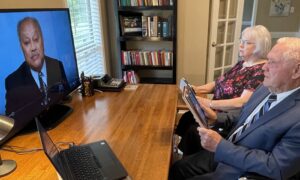It’s been more than a year now since Jehovah’s Witnesses have gone knocking on people’s doors, and according to representatives for the faith group, even after the coronavirus pandemic ends, they may not resume going door to door — a longstanding tradition and act of perseverance for which the community is widely known.

In March 2020, when much of the country went into lockdown to prevent the spread of the coronavirus, the church closed all public meetings at its 13,000 congregations in the U.S., including 1,097 congregations in Southern California serving 150,000 members in 30 different languages.
“We shut down all public ministry, including going door to door, as well as in-home Bible studies for the first time ever in our church’s history,” said Robert Hendriks, national spokesman for Jehovah’s Witnesses. “This was the first time ever in the history of our church that we stopped all kinds of public engagement.”
No more door-knocking?
The church also canceled 5,600 conventions in 240 countries, something it didn’t do during the Spanish Flu pandemic in 1918, which infected about 500 million people worldwide and killed 50 million, Hendriks said.
“We just wanted to make sure that our meetings, ministries and conventions did not cause the spread of this deadly disease,” he added. “It’s unfathomable for us as a people or organization to be held responsible for the deaths of others. It’s irreconcilable with our Christian values and what we preach.”
Despite that knowledge, stopping the door-to-door ministry was a “disorienting event” for practitioners of the faith because evangelism is an inextricable part of their core belief system, Hendricks said.
“People like me grew up knocking on doors and I’ve done that since I was old enough to walk,” Hendriks said. But, he added, “we found we could be effective using other forms of ministry like letter-writing and phone calls. Spirituality is not about a building or being with one another in person. It can still thrive when we’re connected virtually or otherwise. We’re still connecting emotionally, socially and spiritually.”
The pandemic may leave a permanent mark on Jehovah’s Witnesses by ending door-to-door ministry, even after restrictions ease, he said.
“It’s just hard to say if or when that can happen again,” Hendriks said. “There’s no question that meeting people face to face is the most powerful way to reach hearts. But there are many unknowns. We don’t know how resilient the virus is, how it could mutate and whether we’ll reach herd immunity. Even if the danger of community spread is gone, when will someone be comfortable with someone else knocking on their door again?”
The art of letter-writing
Reaching people through handwritten letters and phone calls seems “different,” even intimidating at first, said Whittier resident Kevin Mahard.
“It’s different from speaking in person and reading someone’s body language from which you can get a sense of them and they can see how genuine you are,” he said. “But then, with door-knocking, sometimes people wouldn’t answer the door. You’d see cars in the driveway, but no one would open the door.”
Now Mahard, his wife, Jennifer, and 10-year-old daughter, Jillian, write letters to their neighbors. He says this approach seems effective.
“People seem to read hand-written letters addressed to them,” he said. “It’s like when I got a postcard from my grandma. It is personal and lets them know that I’m a neighbor with genuine concern for them.”
They find their neighbors by going online and looking at public records for addresses and phone numbers of people and families in their ZIP code to whom they can reach out.
Lisa Brown of Anaheim said that this pivot during the pandemic has introduced her sons, Nathan, 14, and Noah, 10, to the long-lost art of letter-writing. Her sons get on Zoom with others in their congregation, and write the letters together, she said.
“They have to focus on their penmanship and make sure it’s legible,” Brown said. “They have to identify themselves, their age and the purpose of the letter.”
They pick from templates that offer different topics such as hope, comfort, dealing with sickness, the pandemic and the loss of a loved one, and connect those topics with a Scripture verse that would bring comfort to someone reading the letter, Brown explained, adding that older recipients appreciate the letters even more because they are personal and uncommon these days.
Nathan Brown said writing has helped him develop patience.
“It also helps me bond with others,” he said. “When we’re with our friends (on Zoom) writing letters, it gives us comfort knowing that we’re not the only ones being restricted.”
Same message, new delivery
Other faith groups such as The Church of Jesus Christ of Latter-Day Saints, also known for their missionary outreach, have stopped knocking on doors and resorted to social media and videoconferencing as a way to communicate with their neighbors.
“Our social media activity has increased tenfold,” said Marshall McKinnon, president of the church’s San Bernardino Mission. “For the last year, we’ve not approached anyone in person. Over the last month or so, with restrictions relaxing, some of our members have started approaching people in public locations like parks, but with masks on and socially distanced.”
With the pandemic, the church has also placed a strong emphasis on acts of community service such as volunteering in food banks or helping neighbors, he said.
“The pandemic has certainly helped us realize how we can be more effective with social media,” McKinnon said. “Door-knocking might be out the door.”
Though she misses the face-to-face communication that comes from door-knocking, Lisa Brown said she doesn’t dwell on what she can’t do or what she may not be able to do in the future because those thoughts can be negative and overwhelming.
“I try not to think too far ahead,” she said. “I just try to think of today. It’s hard not to meet people in person. But we’re still trying to bring love and comfort in ways that we can. Thinking of today keeps the focus on the benefits and blessings we have right now instead of dwelling on what we don’t have.”
Ontario resident Hannah Maisel who attends the Mountain View Hindi-speaking congregation in Riverside said she finds writing letters and making phone calls in a language she is still learning “enjoyable.” She’s also been writing letters of comfort to Indian families, many of whom are dealing with the trauma of seeing the coronavirus pandemic ravage the nation.
“It just breaks my heart to see what’s happening in India,” Maisel said.
If the Jehovah’s Witnesses stop knocking on doors, that doesn’t mean they stop delivering their message, she said.
“I feel like we reach more people now because we don’t have to deal with gated communities and barking dogs,” Maisel said. “I’d love to see the door-to-door ministry come back. But if it doesn’t, I’m happy to do what I need to do.”





